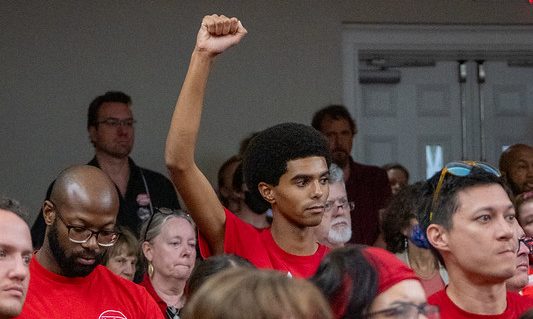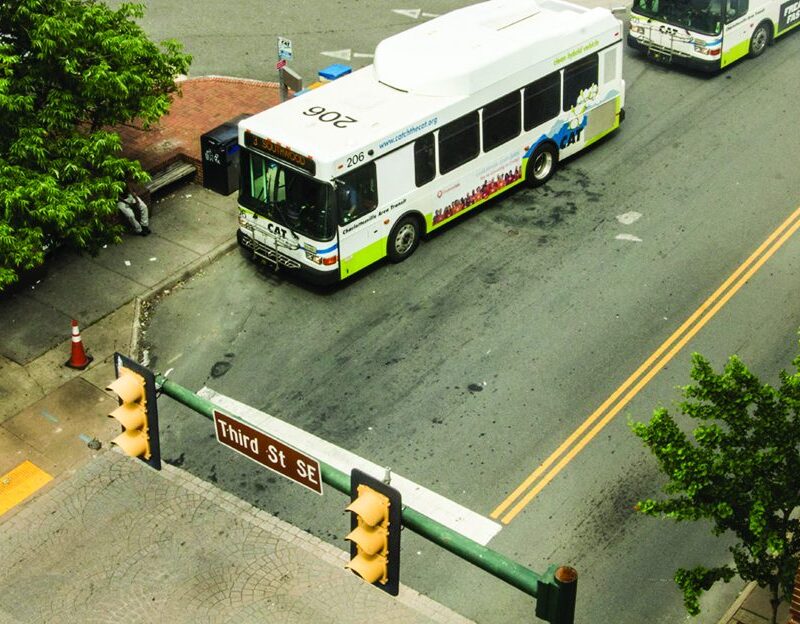By Sofia Heartney
The Albemarle Education Association, the union for Albemarle County teachers and staff, has been negotiating for a collective bargaining agreement with the school board since June.
Teachers have expressed frustration over being tied to contracts that can be “changed at a whim,” says Vernon Liechti, AEA president and a teacher at Albemarle High School. “What’s frustrating to a lot of employees is that when they’re given specific new responsibilities … [they are] not really given necessarily the time, training, or resources to do that particular stuff.”
Mary McIntyre understands how vital the presence of a union can be. A teacher at Journey Middle School and the vice president of the AEA, she’s helping organize and gain support for the Albemarle teachers’ union and putting pressure on the county school board to pass a collective bargaining agreement.
According to the union, collective bargaining will help the district recruit teachers amid a nationwide shortage. “All the school divisions are competing for the same people,” says McIntyre. “You need to have something that you can offer them that your next-door neighbors can’t.”
Though negotiations paused for several weeks in September, the AEA and the school board have resumed talks. The AEA objects to three provisions in the draft agreement: that the school board is able to change contracts at any time, that the AEA must provide new union authorization cards, and a 66-percent participation threshold for union elections.
Including these provisions would strip any potential collective bargaining agreement of its power, according to the union. The school board, however, says the only way it is willing to negotiate is by using its previously agreed upon protocol, and that continuing negotiations is the only way to achieve an agreement.
Collective bargaining by public entities became legal in Virginia in May 2021, after a bill allowing it was passed by the state legislature in 2020. ACPS workers then began organizing to reach a collective bargaining agreement.
In spring 2022, the AEA submitted a resolution for collective bargaining to the school board, but the board rejected that resolution, primarily due to concerns that there was not yet a clear path forward. The group then submitted another resolution in February 2023, which Liechti says “was very similar to the one that the Charlottesville City Schools had just approved.”
The county school board, however, drafted its own resolution using outside counsel, then created a committee consisting of members from both the school board and AEA to negotiate terms. This began the June negotiations between the AEA and the school board.
Beyond the standard benefits of collective bargaining, McIntyre says there are other reasons an agreement is important for ACPS: being able “to retain the staff we have and to recruit high quality staff constantly … [allowing] the people who are in the trenches doing the work with the students every single day a voice in the biggest decisions that affect student outcomes,” including budgetary, scheduling, and curriculum decisions, which she argues will benefit the children of Albemarle County.
In an emailed response to questions, Judy Le, Albemarle County School Board chair, wrote that she does support collective bargaining efforts, pointing to how she has previously voted “twice in support of the Board negotiating a resolution with the AEA.”
After the weeks-long September pause in negotiations, the AEA returned to the negotiating table on October 17—but the two sides disagree on the cause of the initial negotiations pause.
The school board and district say that talks were stopped by the AEA when the union broke agreed-upon protocol and left the meeting. Le says, “When the AEA and the school board negotiation teams began meeting in June, both sides agreed to a protocol that dictated that the draft resolution would be addressed item by item, with points of contention tabled to be revisited later. … Midway through the September 7 meeting, without tabling a point of contention, AEA negotiators read a statement and left the meeting. In doing so, they broke the agreed-upon protocol.”
Phil Giaramita, ACPS spokesperson, said in an email that the protocol “proved useful” up until the September 7 meeting, “as some 70 items were satisfied.”
The AEA also says that such a protocol was not as clear-cut as the school board portrays. “Their protocol doesn’t specify when [points they disagreed on] get addressed,” says Liechti, “and so we didn’t really receive any clarity on that.”
According to Liechti, there were a few aspects of the resolution that made it “antithetical to bargaining.” He says the AEA wanted to negotiate three main provisions before continuing.
The first provision would “[allow] the school board to change a contract at any time. If specifically they declare an emergency, or whenever they decide to change a policy,” says Liechti.
The second deals with union authorization cards, which are signed by employees to indicate their interest in being part of the bargaining unit. The AEA collected cards during its first attempt to reach an agreement on collective bargaining in 2022. When it tried to use those cards again, Liechti says the school board said the cards were “stale” and that it didn’t “trust” the cards.
The third and final provision that caused intense disagreement was the 66 percent participation threshold for electing a bargaining representative.
To the AEA, these provisions were non-starters, and it felt the negotiations could not move forward.
Liechti says if any of those three provisions remained in the final collective bargaining resolution, “it guts the whole point of collective bargaining. … It demonstrates the fundamental lack of trust in the workers of Albemarle County Public Schools.”
In response, Le wrote “When AEA negotiators asked about the school board’s position on some unresolved issues, school board negotiators indicated that its position had not changed since the last meeting. The school board negotiators expected that these matters … would be tabled until the parties had addressed all the remaining provisions in the draft resolution.”
The school board and district did not comment on other specifics of the bargaining process, including the three provisions the AEA would like movement on.
“Publicly talking about concessions, outside the confidentiality of the negotiations themselves, would violate the protocol both parties said would govern the talks,” says Giaramita. He added in a later statement to C-VILLE, “This is the most productive path to what both sides desire—an agreement acceptable to both parties, in the interests of the school division and concluded as soon as possible.”
The AEA says it would like the process to be more transparent, and claims it was the school board that wanted confidentiality. Liechti says the AEA is now focused on gaining more attention on collective bargaining, as “these are things the public should want to know.”
McIntyre sees the need for collective bargaining as something that affects the entire community, reflected by the broad support she’s seen for the AEA. “[The community views] us—their children’s teachers, their children’s bus drivers, their children’s cafeteria, and building staff—as doing really, really important work,” she says. “And they want us to be here doing that work. And so they want this to pass, because they know that that is how they’re going to keep high quality people in their schools.”
School board officials and the AEA have returned to the bargaining table, with meetings planned for December 12 and January 17.






